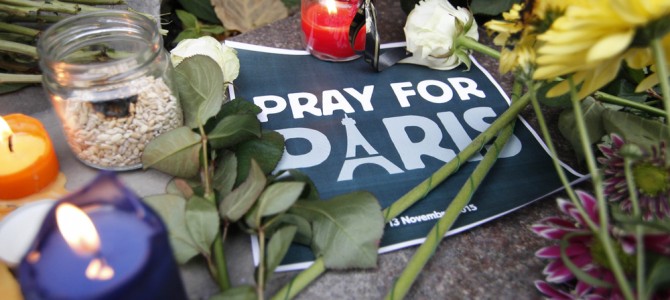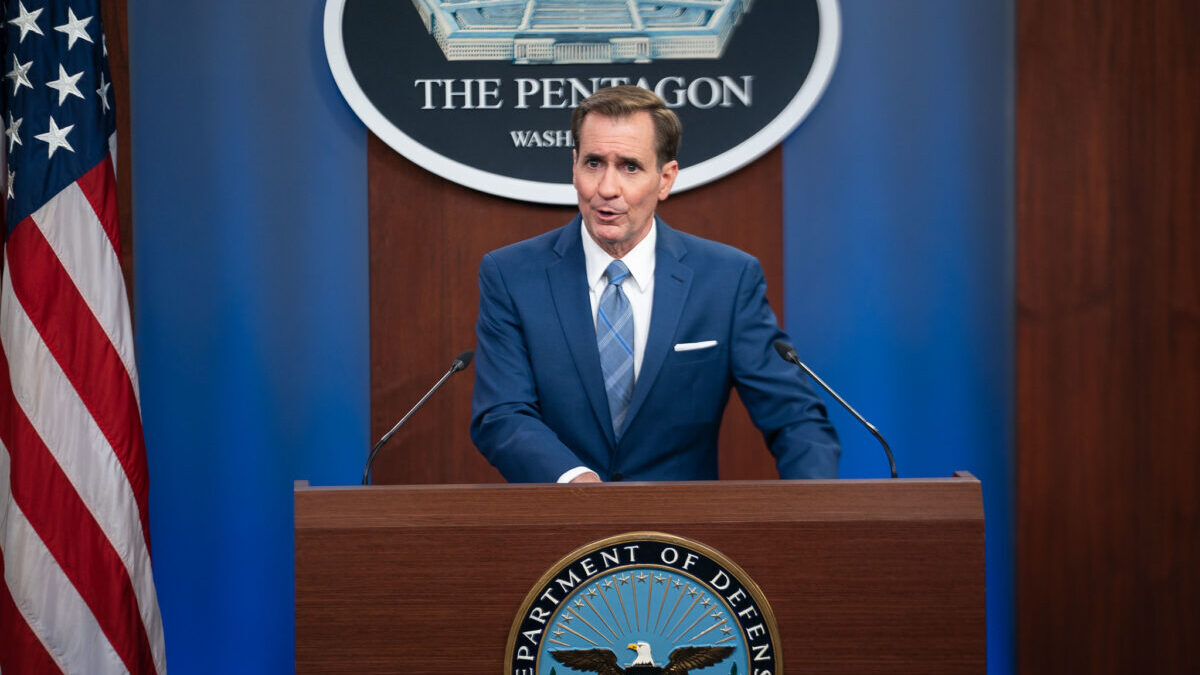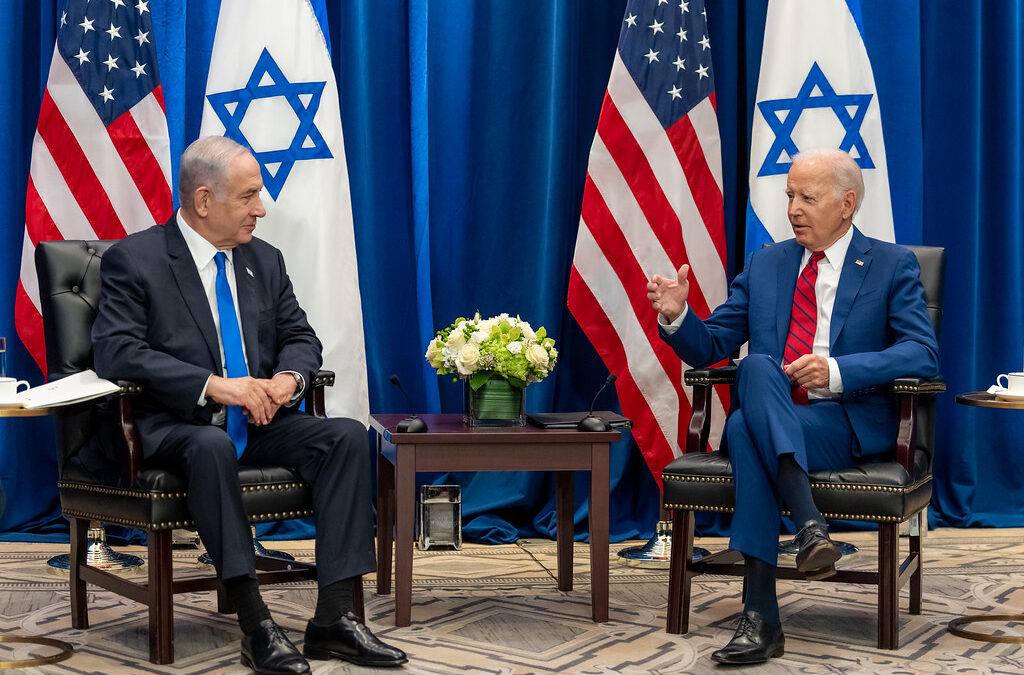
Under President Francois Hollande, the French began their military and legal response to the horrific terror attacks that hit Paris on Friday. ISIS, which took responsibility for the terrorism, threatened the United States that it could be next.
In a video released on Monday, an ISIS fighter says, “I swear to God, as we struck France in its stronghold Paris, we will strike America in its stronghold, Washington.”
CIA director John Brennan said it is obvious that ISIS has an “external agenda” to carry out attacks outside of Syria, is engaged in careful planning toward that end, and that Paris was not the only operation that the group has in the pipeline.
Here are some of the misguided ways various people have responded to the threats posed by ISIS.
1) Obama’s Press Conference
President Obama made some brief comments on the evening of the attacks. “We stand prepared and ready to provide whatever assistance the people of France need to respond,” he said. Also, “This is an attack on all of humanity and the universal values we share.” He didn’t explain which universal values he was referring to or how the attacks occurred if the values are, in fact, universal. The attacks took place the day after Obama said ISIS, a group he once dismissed as the “JV” team, was being contained. ISIS had also just taken responsibility for bombing Beirut and downing a Russian jet.
He also addressed the situation at a press conference at the G20 summit in Turkey on Monday. In both encounters with the press, Obama seemed subdued. In Monday’s, he became righteously angry only when talking about Republicans who oppose his policies.
This was an unfortunate posture to take since he had a profoundly important task of trying to sell Americans on the idea that not much would change about U.S. attempts to fight ISIS while also telling other countries to do more. He haltingly discussed how he always knew it would take a long time to fight ISIS and that what happened in Paris was a “setback.” He said that other countries need to “step up” their resources, share more information, and strengthen their border controls. He also said the U.S. was showing how to take refugees from the conflict in Syria while also ensuring security of the country. These aren’t necessarily bad approaches to take, but he said all this while showing very little emotion or interest. It went over like a lead balloon.
Instead of assuring or reassuring Americans that the refugee program has good security controls, he conveyed precisely the opposite. By the end of the day, some 26 governors had publicly said refugees couldn’t relocate to their states unless and until security concerns were addressed.
But even the press seemed shocked at Obama’s curiously detached, professorial posture. The first reporter asked, “The equation has clearly changed. Isn’t it time for your strategy to change?” The next question was, “Have you underestimated their abilities?” The next question asked whether Obama’s strategy “makes the United States weaker and emboldens our enemies.” That was followed by, “Why can’t we take out these bastards?” And the next reporter asked him if he was even concerned about ISIS before asking, “Do you think you really understand this enemy well enough to defeat them and to protect the homeland?”
When the press, which no objective observer would call hostile to the president, is asking questions such as these, it should be a wake-up call to Obama about the need to at least act like he takes the problem more seriously. Instead he responded with defensiveness and derision.
I actually support much of Obama’s strategy, as stated in this press conference, for dealing with ISIS. And yet rather than selling the idea that this was a strategy that would result in the best possible outcome, he sounded an almost defeatist tone as he claimed a lack of interest in notions of victory. When part of your foreign policy strategy is avoidance of another messy land war, it is absolutely incumbent on you that you communicate why it’s the best possible path. Instead of that, this press conference probably did more to make people think that war is the only solution to ISIS and that the current foreign policy leadership has no idea what it’s doing.
2) All Renditions of “Imagine”
Peter Cook had a great conspiracy theory yesterday: “John Lennon did not write ‘Imagine.’ I think Yoko did, and that’s why it is so terrible.”
The day after Paris was attacked, a man rode up with a piano and began playing “Imagine” to a crowd of mourners. People really enjoyed this. Then Coldplay did a cover of the song.
There are so many problems with “Imagine” on a good day — the lyrics are embarrassingly juvenile as well as godless and communistic. But for the aftermath of an attack that hit people at soccer stadiums, restaurants and music venues, I’m not sure even the lyrics “Imagine all the people/Living for today” work. I mean, enjoying the evening was precisely what the murder victims in Paris were doing at the moment they were gunned down by murderous Islamist radicals.
Simply pick a better song that doesn’t make you seem like you are literally at Chris Martin levels of maturity.
3) Opining On “What ISIS Wants”
When journalists and pundits didn’t support a particular course of action, they began claiming that the opposite was what “ISIS wants,” as if this would be a really effective argument. A few samples (links here, here and here):



ISIS leaders are actually pretty straightforward about what they want. And if you want to read just one article that gets to the heart of who they are and why they exist, I’d recommend “What ISIS Really Wants” from Graeme Wood earlier this year in The Atlantic. It’s not perfect — toward the end it pooh-poohs the idea that ISIS fighters might want to bring the fight back to their home countries — but it does a good job of explaining their motivation and what they seek.
Wood explains that ISIS is committed “to returning civilization to a seventh-century legal environment, and ultimately to bringing about the apocalypse.” ISIS probably does want you to respond to their attacks by playing Yoko Ono tunes rather than killing them before they can strike again, but that in itself is not reason to avoid playing “Imagine.”
Germany sought war as part of its goals, but that wasn’t a reason to avoid entering World War II. Japan quite obviously provoked the U.S. into entering that same war when it bombed Pearl Harbor. The idea that our country should then have sat it out is also not a tenable argument. And questions about balancing security and humanitarian efforts are not something you toss out the window because ISIS has a policy position on the matter. We are far too advanced to fall for such silly lines of thinking.
Or as this Twitter user noted:

4) Saying ISIS Fears Peace Talks
Green Party foreign affairs spokesperson, Tony Clarke said: “The killing has to stop and world leaders must find a way forward that defeats ISIS using the weapon that these terrorists fear most of all, peace talks.”
Fact check: Not true. ISIS doesn’t fear peace talks at all. Have they not the faintest idea what ISIS even is? This Facebook post that went viral is a bit long but worth sharing.

5) So Much Stupidity in Discussions About Refugees
Millions of people have left Syria in search of better economic prospects or relief from the ongoing civil war. As discussed in “When Is A Refugee Really A Migrant?” there are differences between different groups of people. For refugees, you frequently see entire families leaving and both men and women leaving. For migrants seeking work, different patterns emerge. In the case of the current migrant/refugee crisis, more than 70 percent are adult males, and only about 15 percent are children. It’s unclear why the demographics are so overwhelmingly adult and male, but it’s something journalists and policy makers should be interested in answering, particularly as they position the crisis as one affecting refugees.
Related to this discussion, one of the terrorists in Paris had a Syrian passport with him that he used to come in — with refugees — to France and passed through five countries on his way there.
Obama has promised to take in 10,000 Syrian refugees this fiscal year. Some Americans question whether the country’s security bureaucracy would protect against threats from eager ISIS terrorists. Americans are concerned about border security in general, even before wondering if the government can handle something as delicate as a resettlement program. As mentioned above, more than half of the country’s governors are expressing concern about the plan. In fact, only 14 percent of the states are still accepting Syrian refugees. Other Americans say that it’s the country’s humanitarian duty to welcome Syrians. To my mind, both concern for security of the country and for Syrians in need are understandable.
But people pretty much lost their minds when discussing the situation. Some GOP presidential candidates, such as Mike Huckabee and Chris Christie, went way overboard in expressing concerns about security. Others caricatured security concerns with a notable lack of charity:


I actually don’t know enough about how well the U.S. is prepared to handle security risks in refugee and migrant resettlements, although I have spoken to some federal agents whose lack of confidence in bureaucratic handling of the size and speed of the resettlement gives me pause. My heart bleeds for those in need and also for those victims whose countries failed to protect them from exploitation of the refugee crisis. I can’t stop thinking about the family members of all those many Parisians who were killed on Friday.
People seriously need to have a more mature conversation about the seriousness of the problem facing some refugees, the presence of a migrant population seeking economic relief, the reality of security threats, and the challenges of resettlement for both migrants and refugees. And it is the most obvious common sense out there to be concerned about security — that’s basically the first order of business for humans — and the media could really stop all the signaling and moral preening about how people concerned about security are monsters.
6) A Fake Passport Means Governors Are Wrong to Worry
So the Syrian passport used by one of the Paris terrorists appears to be fake, not that this kept its user from registering with it when he arrived with a group of refugees and traveling through various countries with it as he made his way to France.
A Daily Beast story by Michael Weiss and Justin Miller begins this way:
One of the Paris attackers was supposedly found with a Syrian passport—leading Republican governors here in America to vow to block Syrian refugees from entering their states.
But that passport was a fake, French officials told The Wall Street Journal, which means the governors’ freakout over refugees was likely based on a lie.
Later, they wrote:
Texas Gov. Gregg Abott also fell for the ISIS ruse.
“A Syrian ‘refugee’ appears to have been part of the Paris terror attack,” he wrote in a letter to the Obama administration on Monday.
I don’t know how this isn’t obvious to the folks at the Daily Beast, but the fact that ISIS appears to have intentionally and successfully exploited the refugee system to bust an agent into enemy territory only helps the arguments of those concerned about security and refugees. It’s not like the fakeness of the passport means that the terrorist is fake. He was all too real. And it doesn’t mean he didn’t come into enemy territory by claiming to be a refugee. He still did that. And even that Abott specifically scarequoted ‘refugee’ to point out that the terrorists wasn’t an actual refugee but one posing as such means that he didn’t fall for a “ruse.” This is really stupid analysis, in fact.
If people spent a bit of time understanding the arguments of their opponents, they’d understand that the concern isn’t that refugees are all terrorists waiting to attack but that terrorists could pose as refugees. As happened, apparently, in Paris.
7) Mocking People Concerned About Refugees and Security
As seen above, many progressives were mocking people concerned about security risks in light of mass migration and refugee resettlement. Perhaps the best example of this is a whopping 18-minute snarkfest from TV’s John Oliver, an entertainer on HBO.
He relentlessly mocks those who point out that refugee and migrant programs involve tradeoffs — thinking that the mention of appeals to unspecified authorities and jokes and signaling are sufficient retorts that destroy such arguments. The piece, which aired in late September, included the following line:
“And I know lots of people still have fears… fears that migrants might have an ISIS member lurking among them, which there has been no credible example of.”
This elicited the predictable response from partisans.


And when it turned out that such concerns weren’t just rational but realized? Well, moving right along.
8) Migrants Are This Close to Joining ISIS
One of the less successful arguments made by people who encourage more openness to quick migration is exemplified by this piece in the Washington Post headlined, of course, “The Islamic State wants you to hate refugees.”
The piece is very pro-refugee, but it implies that refugees are pretty close to joining ISIS and all it would take to nudge them there is a bit of a snub from Western governments. This is a horrible argument to make to people already concerned that refugees harbor a terrorist or might include people who are close to joining ISIS. This poll, for instance, shows that not-insignificant percentages of refugees have a favorable view of ISIS.
9) Downplaying the Evil of ISIS
This tweet from a Democratic candidate for the Minnesota House has been deleted and, in fact, the campaign has ended. That is probably for the best, as such moral relativism that excuses murderous ideologues who gun down women in cafes is reprehensible.

10) Global Warming Caused ISIS
Just no.

And yes, I know Bernie Sanders says similar things, but if you believe climate change caused ISIS, you are simply not a serious person.
11) Your Hot Gun Control Take
Terrorism isn’t a word meaning “bad thing.” It’s a specific word with a specific definition. So not all bad things are the exact same things as other bad things. Someone tell the Philadelphia mayor, though.

There’s pretending to not understand what motivates ISIS. Then there’s this, from Boston Globe columnist Michael Cohen.

12) A Sudden Interest in Not Politicizing Something
Last month a man fatally shot eight students and a professor at Umpqua Community College in Oregon. The president, his fellow Democratic politicians, and the media immediately politicized the shooting. And I do mean immediately. With bodies still warm, Obama said, “this is something we should politicize.” He asked the media to write stories comparing gun deaths to terrorism, and they did just that.
But in the face of a terrorist attack, many people changed their tune. Then, then, then vs. now. Then, then vs. now.
The idea that we can’t talk about the political implications or solutions to Islamic extremism but must demand gun control (always gun control, never other solutions) at each mass shooting is inconsistent.
13) This Has Nothing to Do With Islam
Pioneered by President George W. Bush, Americans and other leaders are fond of protecting Islam each and every time Muslim terrorists kill people. It is certainly wise to distinguish between different types of Muslims and to encourage and recognize the many Muslims who live in peace with their neighbors. It is also beyond silly how much we pretend the Islam practiced (in this case) by ISIS isn’t a major animating force.
Here was Michael Gerson’s version of the “What ISIS wants” meme that captivated so many pundits this week:

The problem is that ISIS is Islamic. To go back to The Atlantic article referenced above:
The reality is that the Islamic State is Islamic. Very Islamic. Yes, it has attracted psychopaths and adventure seekers, drawn largely from the disaffected populations of the Middle East and Europe. But the religion preached by its most ardent followers derives from coherent and even learned interpretations of Islam.
Could ISIS Exist Without Islam?
Virtually every major decision and law promulgated by the Islamic State adheres to what it calls, in its press and pronouncements, and on its billboards, license plates, stationery, and coins, “the Prophetic methodology,” which means following the prophecy and example of Muhammad, in punctilious detail. Muslims can reject the Islamic State; nearly all do. But pretending that it isn’t actually a religious, millenarian group, with theology that must be understood to be combatted, has already led the United States to underestimate it and back foolish schemes to counter it. We’ll need to get acquainted with the Islamic State’s intellectual genealogy if we are to react in a way that will not strengthen it, but instead help it self-immolate in its own excessive zeal.
14) This White House Talking Point
VOX may not be taken very seriously, but it’s worth remembering that it funnels White House talking points. So consider that this may be something the White House wishes were believed.

Nailed it!
15) Enthusiastic Late Night Hosts Aren’t an Actual Victory Strategy
People really enjoyed a few of the late night shows’ reactions to the Paris terror attacks.


Oh no he di’int! Suh-nap! That John Oliver is amazing. He just “destroyed” ISIS!
Oh wait, no. They’re still totally thriving and killing Parisians, beheading Christians, and raping women. I guess we’ll have to come up with another plan.
16) Atheist Biblesplaining
One of the hottest responses to the Parisian terror attacks was to not just stop talking about ISIS by talking about all the refugees you care about more than the other guy. And one of the most popular ways to do that was by referencing Mary and Joseph not finding a room at an inn when they traveled to Bethlehem for the census.
So this abortion enthusiast, for instance, offered:

An “ultra-liberal gay atheist university professor from Massachusetts” wondered “How many conservatives who now turn away desperate Middle-Easterners seeking refuge will soon be putting up a Nativity?” Shaun King quoted Leviticus, of all books of the Bible, to attempt to shame those concerned about protecting the security of their families and neighbors.
One satirical Twitter account explained the silliness of these tweets that spread with righteous indignation throughout social media.

Like you, I love being lectured about human decency by people who defend Planned Parenthood. But since when did liberals decide the Bible should be the basis of public policy? Imagine the implications for marriage law! Except it’s not that they want the Bible to be the basis of public policy. They want their facile and smorgasbord-like interpretation of the Bible to be the basis for public policy.
Loving your neighbor is both simple and complex. Preserving security is a form of loving your near neighbors. Welcoming the foreigner is a form of loving other neighbors. These are at times competing concerns, and Christian theologians have discussed what to do in times of conflict for thousands of years. Americans would do well to learn from those discussions.









